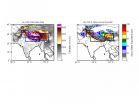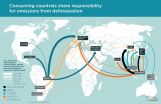(Press-News.org) EAST LANSING, Mich. — Some scientists share better than others. While astronomers and geneticists embrace the concept, the culture of ecology still has a ways to go.
Research by Michigan State University, published in the current issue of Bioscience, explores the paradox that although ecologists share findings via scientific journals, they do not share the data on which the studies are built, said Patricia Soranno, MSU fisheries and wildlife professor and co-author of the paper.
"One reason for not sharing data is the fear of being scooped by another scientist; but if all data are available, then everyone is on the same playing field, there are more people to collaborate with, and you will have a bigger impact on science," said Soranno, an MSU AgBioResearch scientist. "Think of the advances being made in genomics, for example, due to the human genome project and the free-flowing findings and data. Genomics is advancing at an unprecedented rate, and it's having an impact on many other fields as well."
The paper's co-authors and the diverse fields they represent exemplify this new era for sharing in ecology and many other fields. The team comprised MSU researchers from the Lyman Briggs College, including Kendra Cheruvelil, fisheries and wildlife; Kevin Elliott, a philosopher in fisheries and wildlife; and Georgina Montgomery, history.
While many environmental scientists support the notion of sharing, the vast majority of them do not carry out their good intentions, according to a recent survey. Even with calls from funding organizations, scientific journals and even the White House, it's still yet to instill sharing as a matter of practice, Montgomery said.
"If you advocate for inclusion in science, if you believe scientists should be engaged with the public and decision makers in policy, then you should walk the walk and share your data," she said. "Collaboration, rather than competition, is the best way to continue to advance science."
To improve the current culture, the team argues that increased data sharing will allow more diverse people to actively participate in research, such as early-career scientists and those from underrepresented groups; scientists from smaller or historically less-influential institutions; citizen-scientists; and scientists from the Global South, scientists from Africa, South and Central America, and much of Asia who are often excluded from leading research.
The culture is beginning to change, but now it's time to find ways to implement it, Cheruvelil added.
"We'll still need to work through the best way to make this the norm," she said. "We're not saying to share data as soon as it's gathered, and we understand that there's not a one-size-fits-all policy. Our hope is that scientists will change their practice because they are compelled by the argument that they are ethically obliged to, not because they are forced to share data."
Future research will focus on scientist-driven approaches to making data more shareable and increasing incentives at an institutional level. Universities offer few, if any, motivations to share data. It would help to offer credit for sharing rather than for solely emphasizing published papers, Cheruvelil added.
Outside of universities, sharing data is key because there are many efforts to include community-based monitoring groups to help inform decisions and policies about the environment.
"If environmental scientists truly espouse the ethical value of inclusivity, including diverse groups of people at the tables of research, decision making, policy and public debate, it is not only necessary to share scientific data, it is ethically obligatory," Elliott said.
INFORMATION:
Michigan State University has been working to advance the common good in uncommon ways for more than 150 years. One of the top research universities in the world, MSU focuses its vast resources on creating solutions to some of the world's most pressing challenges, while providing life-changing opportunities to a diverse and inclusive academic community through more than 200 programs of study in 17 degree-granting colleges.
HOUSTON – (Oct. 22, 2014) – Is there an "immigration crisis" on the U.S.-Mexico border? Not according to an examination of historical immigration data, according to a new paper from Rice University's Baker Institute for Public Policy.
"'Illegal' Immigration on the U.S.-Mexico Border: Is it Really a Crisis?" was co-authored by William Gruben, a research associate at the Federal Reserve Bank of Dallas' Globalization and Monetary Policy Institute, and Tony Payan, the Baker Institute's Françoise and Edward Djerejian Fellow for Mexico Studies and director ...
A start-up company in Scotland is working to capitalize on the tons of waste produced by one of the country's most valued industries and turn the dregs of whisky-making into fuel. Celtic Renewables, formed in 2011, has refined its process based on a century-old fermentation technique and is now taking the next step toward a commercial plant, according to an article in Chemical & Engineering News (C&EN), the weekly newsmagazine of the American Chemical Society.
Ann M. Thayer, a senior correspondent with C&EN, points out that making whisky requires three ingredients: water, ...
Just in time for flu season, a new Michigan State University study of "the mother of all pandemics" could offer insight into infection control measures for the flu and other epidemic diseases.
Siddharth Chandra, director of MSU's Asian Studies Center and professor in MSU's James Madison College, and Eva Kassens-Noor, assistant professor of urban and transport planning with a joint appointment in the Global Urban Studies Program, studied the evolution of the 1918 influenza pandemic, aka the "Spanish flu." In 1918, the virus killed 50 million people worldwide, 10 to 20 ...
BOZEMAN, Mont. – A team of researchers including Montana State University professor Selena Ahmed has found that shifting patterns of precipitation affect key chemicals responsible for the flavor and health properties of tea.
Ahmed, assistant professor of health and human performance in the MSU College of Education, Health and Human Development, said the team's research shows that major antioxidant compounds that determine tea health properties and flavor, including epigallocatechin, epigallocatechin gallate, epicatechin gallate, gallocatechin gallate, catechin ...
Taking steps from an early age to improve childhood education skills could raise overall population levels of academic achievement by as much as 5%, and reduce socioeconomic inequality in education by 15%, according to international research led by the University of Adelaide.
In a study now published in the journal Child Development, researchers from the University of Adelaide's School of Population Health and colleagues at the University of Bristol in the UK have modelled the likely outcomes of interventions to improve academic skills in children up to school age. They ...
Philadelphia, Oct. 22, 2014 – New work by a pioneering scientist details how subtle changes in mitochondrial function may cause a broad range of common metabolic and degenerative diseases. Mitochondria are tiny energy-producing structures within our cells that contain their own DNA.
The new research shows that small changes in the ratio of mutant to normal mitochondrial DNA within the thousands of mitochondrial DNAs inside each cell can cause abrupt changes in the expression of numerous genes within the nuclear DNA. Furthermore, the different proportions of mutant ...
Using loan level data matched to consumer credit records, researchers have been able to determine that a reduction in mortgage payments of as little as $150 a month spurred a reduction in mortgage defaults and an increase in consumer spending (particularly the financing of automobile purchases), while improving household credit ratings.
University of Chicago Booth School of Business Professor Amit Seru, together with Benjamin J. Key of UChicago's Harris School of Public Policy, Tomasz Piskorski of the Columbia Business School and Vincent Yao of Fannie Mae authored "Mortgage ...
New Rochelle, NY, October 22, 2014—A panel of leading clinicians and researchers across various general and specialty pediatric fields developed a consensus statement recommending how to evaluate youngsters in whom neuropsychiatric symptoms suddenly develop, including the abrupt, dramatic onset of obsessive-compulsive disorder (OCD). This difficult diagnosis is typically made by pediatricians or other primary care clinicians and child psychiatrists, who will benefit from the guidance provided in the recommendations published in Journal of Child and Adolescent Psychopharmacology, ...
Researchers from Princeton University and other institutions may have hit upon an answer to a climate-change puzzle that has eluded scientists for years, and that could help understand the future availability of water for hundreds of millions of people.
In a phenomenon known as the "Karakoram anomaly," glaciers in the Karakoram mountains, a range within the Himalayas, have remained stable and even increased in mass while many glaciers nearby — and worldwide — have receded during the past 150 years, particularly in recent decades. Himalayan glaciers provide ...
International trade with agricultural and wood products is an increasingly important driver of tropical deforestation. More than a third of recent deforestation can be tied to production of beef, soy, palm oil and timber. "The trend is clear, the drivers of deforestation have been globalized and commercialized", says assistant professor Martin Persson, Chalmers University of Technology.
In a report commissioned by US think-tank Center for Global Development (CGD) Martin Persson and colleagues in Linköping, Sweden, and Vienna, Austria, have investigated to which extent ...




